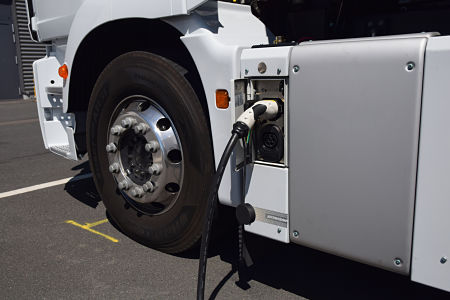ATRI analysis explores how electric vehicles can pay their way
A recent study by the American Transportation Research Institute (ATRI) addresses the question of how electric vehicles will pay their fair share into the Highway Trust Fund (HTF) under the existing motor fuels tax collection method.
Through a small tax on the electricity that is used in transportation, the report identifies an approach to efficiently connecting the growing number of U.S. electric vehicles with highway trust fund (HTF) revenue streams.
At present, electric vehicles do not contribute substantively to state and federal highway trust funds. In fact, there are numerous programs that subsidize the use of electric vehicles, thus exacerbating the infrastructure investment deficit. ATRI’s analysis quantifies this revenue loss at more than $4 billion over the next 10 years.
The report suggests that U.S. electric utilities are well equipped to begin collection of a per-kWh charge of 2.1 cents for transportation-related electricity consumption in the coming years. Using a phased approach, utilities would identify, measure and tax electricity that is used for transportation – starting first with electricity that is dispersed through public charging stations and residential smart chargers.
“This analysis demonstrates how an electricity tax can easily emulate all the key components of a fuel tax. Moving forward with an efficient utility-based approach will help EV owners support the infrastructure that they use every day,” said Paul Enos, CEO of the Nevada Trucking Association.
The issue has surfaced as part of the proposed infrastructure bill being weighed and measured in Congress. One electric vehicle incentive package calls for a $12,500 in electric vehicle incentives that includes extra cash for union-made cars and trucks produced in the U.S.
Tesla, Toyota, and other automakers have criticized the proposal and say favoring union-made vehicles would benefit General Motors, Ford and Stellantis (formerly Fiat Chrysler).
The incentives include a current $7,500 tax credit to purchase a plug-in electric vehicle as well as $500 if the vehicle’s battery is made in the U.S. The bill also removes a 200,000-vehicle phase-out of the credit, allowing GM and Tesla customers to once again be eligible for the incentive. Buyers of EVs produced by unionized workers in the U.S. would be eligible for an additional $4,500 in tax credits, bringing the total incentives to $12,500.
Toyota described the bill as “unfair” and “wrong,” citing the proposal discriminates against its U.S. workforce that is not unionized.
“The current Ways and Means Committee draft makes the objective of accelerating the deployment of electrified vehicles secondary by discriminating against American autoworkers based on their choice not to unionize,” Toyota manufacturing executives said in a letter to the chairs of the committee. “This is unfair, it is wrong, and we ask you to reject this blatantly biased proposal.”
Autos Drive America, a lobby organization representing international automakers in the U.S., called the EV incentive package “un-American” by creating an “unlevel playing field that will limit consumer choice and punish non-unionized American workers, their families, and their communities.”
In a statement, Kumar Galhotra, president of Ford’s Americas & International Markets Group, said, “This legislation will help more Americans get into EVs, while at the same time supporting American manufacturing and union jobs. As the automaker who assembles more vehicles in America than any other, Ford is doing our part to lead the electric vehicle revolution by investing tens of billions of dollars in EVs.” He added the F-150 Lightning and E-Transit will be built in Michigan and Missouri respectively.
In Great Britain, public sentiment is growing to increase taxes on electric vehicles to compensate for losses in fuel tax revenues.
A study conducted by Venson Automotive Solutions found that 87 percent of UK motorists agree fuel tax losses need to be recouped as EV adoption continues to rise.
The study surveyed 300 drivers, whose opinions differed on how the possible £40 billion of fuel tax losses could be covered.
A new EV tax – which could see drivers of heavier vehicles, as opposed to those of a larger engine size, paying heftier taxes – took 38 percent of the vote.
Another 32 percent of those surveyed suggested free public EV charging points be replaced with charged ones and 27 percent of the public felt that businesses operating EV fleets should incur more costs.






